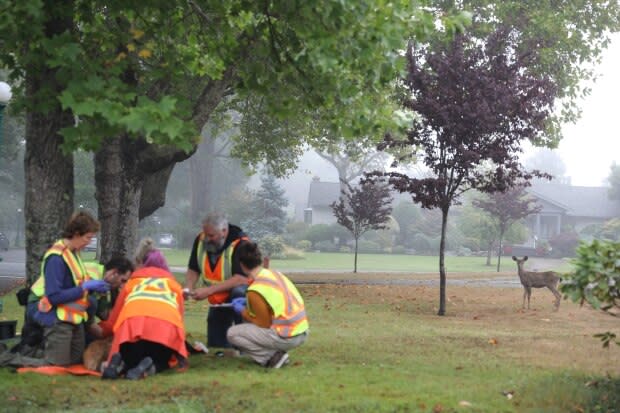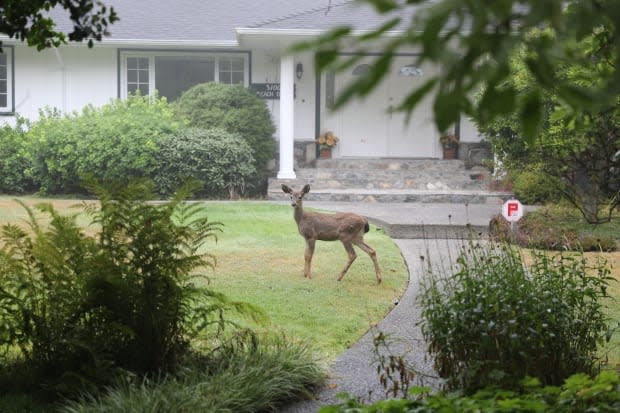Urban deer get birth control to curb overpopulation
On the southern tip of Vancouver Island sits the small community of Oak Bay.
For years it's been stalked by roving urban deer.
But now science is stepping in a bid to stop the population from procreating.
Researchers, along with the Urban Wildlife Stewardship Society, scientists and veterinarians, are giving birth control to dozens of wild deer.
Lead researcher Jason Fisher says it's a first-of-its-kind study in Canada and, if successful, could help shape the future of animal management across the country.
Residents who initially loved the deer have had their patience tried.
"At first, I thought they were adorable and now they are such a pest," said Signi Murgatroyd, who lives in the area.

So in 2015, in bid to reduce numbers, Oak Bay Council culled 11 deer. But residents didn't like the idea of killing the animals and the approach didn't work in the long run.
The deer continued to do what they usually do, eating people's gardens, defecating on lawns, walking into traffic and causing roaming chaos in the community — prompting the search for another alternative.
"There was a call for people to do something that was not a cull that would not incur a loss to deer lives, that was a bit more humane and also science-based — that's the key part," said Fisher, who works with InnoTech Alberta and the University of Victoria.
Could this work long-term?
So the study into deer contraceptives was born.
But the project is about much more than a one-off birth control jab.
Researchers say the study's aim is to find out if immunocontraceptives could control deer populations over a long period of time.
To do that, researchers first needed to figure out how many deer were living in the area.
Estimating that number was not easy, but with the help of dozens of remote cameras, the deer population was pegged at about 100 in 2017.

For the study, 20 female deer won't receive any birth control. Another 40 to 50 does within the population will receive the contraceptive shot.
Fisher said sectioning off the 20 female deer for a control group is important because researchers need to know how successful the contraception is.
By looking at that specific group, he said, "we can be very sure that the drug is affecting fawning rate and it's not something else like differences from year to year and weather or available forage and things like that."
No easy task
The team sets out early most mornings, when deer are most active, in order to administer the contraceptive before rutting season begins.
Once the team spots a deer without a collar or ear tags, indicating it's in the experiment group, the researchers sedate it with a dart shot, wait until it falls asleep and take it into the open to administer the drug.
During that time, the researchers also make notes on the general health of the deer and take fur, blood and stool samples to examine.
After that's finished, the doe is given an anti-sedative, which wakes it up.

The immunocontraceptive drug is not permanent and works by creating a shell on the outside of a doe's egg, making it harder to fertilize and result in a pregnancy.
"The end goal here is a stable population. Some people would say their preferred end goal is no deer but that's not going to happen and I don't think that's desirable," said Fisher.
Adam Hering, a veterinarian involved in the study, said the team's work draws plenty of spectators with lots of questions.
"It's very much in everybody's front yard," he said. "Lots of people love the deer. Lots of people hate the deer. So it's challenging finding a solution that everybody feels good about."
The B.C. government is also distributing $100,000 for urban deer management programs, with funding targeted for areas where deer can't be hunted. The money must be matched locally, usually by a First Nation or a municipality.
'Breaking a lot of new ground'
Oak Bay Mayor Kevin Murdoch said residents have become "tipped over a line" by the sheer number of deer, but he's hopeful this study could help the town take back control of its streets.
"We're breaking a lot of new ground, which is good in the sense that it'll help inform a lot of other deer control activities in other urban centres. At the same time, we also just want to have an impact at reducing the deer population."
If the study proves to be successful in Oak Bay, Fisher said it could help shape strategies in dealing with urban populations of animals across Canada.
"We know it works out in the wild. If we can make it work in urban areas, then I think if there's enough evidence and that generates the political will to get people to say yes, we would like this kind of research to go forward," said Fisher.
Researchers are confident the contraception vaccine will work, but like all birth control, it's not always a sure thing.
In this case, they will have to wait until next spring to see if their intervention will override Mother Nature.


